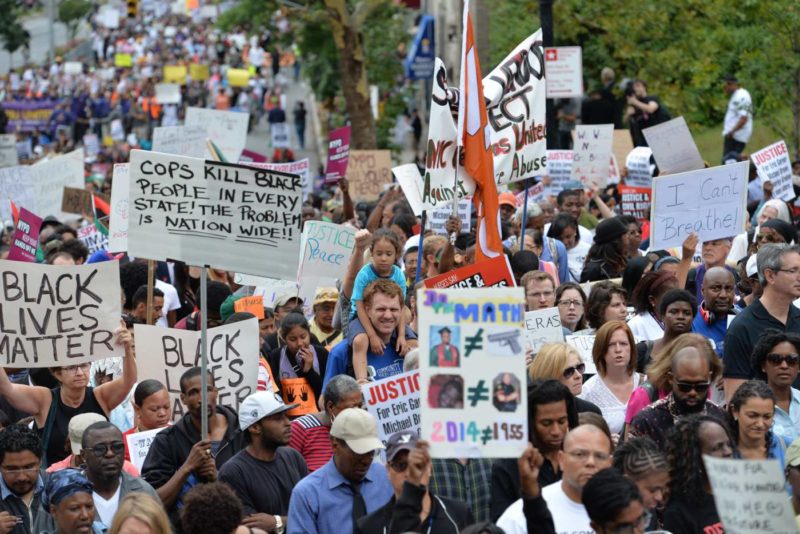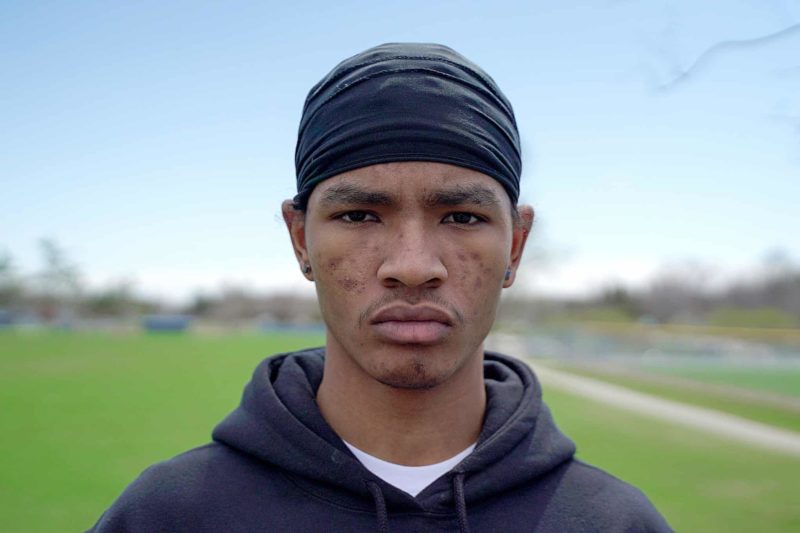Special News Series: Rising Up For Justice! -‘I allowed myself to feel guilty for a very long time’: the teenage cashier who took George Floyd’s $20
Share
Explore Our Galleries
Breaking News!
Today's news and culture by Black and other reporters in the Black and mainstream media.
Ways to Support ABHM?
Introduction To This Series:
This post is one installment in an ongoing news series: a “living history” of the current national and international uprising for justice.
Today’s movement descends directly from the many earlier civil rights struggles against repeated injustices and race-based violence, including the killing of unarmed Black people. The posts in this series serve as a timeline of the uprising that began on May 26, 2020, the day after a Minneapolis police officer killed an unarmed Black man, George Floyd, by kneeling on his neck. The viral video of Floyd’s torturous suffocation brought unprecedented national awareness to the ongoing demand to truly make Black Lives Matter in this country.
The posts in this series focus on stories of the particular killings that have spurred the current uprising and on the protests taking place around the USA and across the globe. Sadly, thousands of people have lost their lives to systemic racial, gender, sexuality, judicial, and economic injustice. The few whose names are listed here represent the countless others lost before and since. Likewise, we can report but a few of the countless demonstrations for justice now taking place in our major cities, small towns, and suburbs.

To view the entire series of Rising Up for Justice! posts, insert “rising up” in the search bar above.
‘I allowed myself to feel guilty for a very long time’: the teenage cashier who took George Floyd’s $20 bill
A year ago, Christopher Martin took an allegedly counterfeit bill. The police were called, and shortly after, Floyd would be dead.
By Oliver Laughland, Amudalat Ajasa, The Guardian
May 23, 2021

Christopher Martin lived above a bricked grocery store in south Minneapolis, with a maroon awning and bold red signage that reads Cup Foods. So when a cashier’s position came up last year, he took it without thinking.
He quickly learned the regulars’ orders by heart, their specific tobacco preferences, their favored snacks. The job was more than just a paycheck. “A family, community base,” he remembered. “A lot of jokes and laughs.”
But on 25 May last year, he served a customer he had never met before, igniting a chain of events that rippled around the world and irreversibly changed Martin’s life.
It was George Floyd, who had come to Cup Foods that day to buy a packet of cigarettes. He handed Martin an allegedly counterfeit $20 bill. Martin accepted, and then informed his managers. A co-worker called the police. And shortly after, George Floyd would be dead, held for nine minutes and 29 seconds under a white police officer’s knee as Martin watched from the sidewalk in disbelief.
Within hours Minneapolis would be awash with protest and the world would grapple with yet another reckoning on racism and policing. And for months Martin would be plagued with guilt.
In the year since George Floyd was murdered by former police officer Derek Chauvin, Martin, 19 years old, has been on his own journey. Within a week he and his family moved from their apartment. He quit his job. He battled with grief and trauma. And eventually he testified as an eyewitness in Chauvin’s murder trial – one of the most closely watched and significant cases in modern American history.
On a warm spring day, shortly after testifying, he sat in a park near his new home, one of a number of interviews Martin has given to the Observer over the past months.
“I allowed myself to feel guilty for a very long time before the trial happened,” he said softly, with an eloquence that belies his teenage years. “I just kept replaying that decision in my head. What if I would have just told him he couldn’t buy the cigarettes?”
Martin testified on the third day of the trial. He was one of seven bystanders to take the stand, a choice he made “to tell the whole world what really happened that day”.
Dressed in a black and grey windbreaker, he told the jury calmly how he had considered putting the counterfeit $20 on his own tab, but had been told by store managers instead to confront Floyd before the police had been called. The court saw CCTV footage of Martin pacing the sidewalk, his hands on top of his head, as Floyd was pressed to the ground by officers.
“Disbelief and guilt,” he said as prosecutors asked him to describe how he felt in those moments captured on CCTV.
Despite his composure, Martin recalled his anxiety as he began to testify. It was his first timein acourtroom and he was aware that his words were being watched all around the world. He felt himself sweat. At times he zoned out. He was thankful that Chauvin was not in his eyeline.
After he was dismissed, he left the courtroom and broke down in tears. In all of the months leading up to the trial he had never cried for George Floyd, but delivering his testimony was overwhelming.
“It was like a wave of sadness and grief out of nowhere,” he remembered. “It was a good cry. It was kind of like a release of everything.”
The Floyd murder had entered his mind periodically before the trial – sometimes he would fixate on it, at other times he would try to let it pass, but after testifying he set aside his pride and began to lean more on church mentors and family for support and counselling.
“It was a Matrix sort of feeling,” he said, describing how it felt to witness a man he had only met for a momentdie in front of him. “Like an out-of-body experience. It’s unreal. Unexplainable. You know there’s nothing you can do. There’s a lot of things in life that you have no control of. But it’s even worse when it’s right in front of you. And, you know, you just wish you could take back the decisions you made.”
Martin was raised by a single mother, the youngest of five siblings. He struggled with his studies and was expelled a number of times, before transferring to a Christian boarding school 70 miles from Minneapolis. He learned the trombone and loved maths class. And last year he graduated high school in a state which has the lowest graduation rate, just 65%, for Black students anywhere in the United States.
He harbors a long-term desire to leave Minnesota and become a realtor in California. For now, he has taken up a new job as a store clerk in a local Adidas retailer and spends some of his spare time obsessing about the Premier League, following Manchester City.
Almost as soon as the murder had taken place last year, his family left home. Martin no longer felt safe and worried about reprisals from the police themselves.
His opinion of the Minneapolis police department had already been coloured by an episode he’d had six years earlier. He had been on his way to football practice, dressed in sports gear, when an officer began asking questions about what was inside his bag, and tried to seize it. His older brother attempted to intervene and was slammed against a wall.
“It was just so uncalled for.”
Martin had initially refused to be questioned by investigators examining Floyd’s death, a decision guided by his distrust of police. He said he was subpoenaed in order to give his account. His mother and sister had moved into a hotel and he was living with his youth pastor. The stress of it all took a toll.
“I felt like I was always on go mode,” he said of those months in the immediate aftermath. “I never got a chance to take a break and just lie down and get some rest.”
Hours after the guilty verdicts against Chauvin were delivered, Martin returned to Cup Foods and stood at the site where Floyd took his last breath.
“Miss you brother,” he posted on Instagram below a picture of himself looking up at a giant mural of Floyd painted next to the store.
The verdicts led to a collective exhale of tension around the world and a feeling that some form of accountability had been reached. For Martin, it was a moment of personal catharsis. He felt the weight of the guilt beginning to dissipate.
“I can realize the only person responsible is Derek Chauvin,” he said, acknowledging his own testimony had helped secure the conviction. “It’s a day by day thing, a long process. Hearing he was guilty took a lot of [my] guilt factor away.”
And then there is the prospect of having to testify again. Three other officers involved in Floyd’s arrest have been charged over the incident by local prosecutors, and earlier this month the federal government announced a separate suite of civil rights charges against all four officers involved.
“I guess it kind of sucks it’ll be dragged up again in a year,” he said as he shrugged his shoulders and sighed.
The cycle of trials in the Floyd case underlies a broader cycle of police violence. Martin watched in horror as the police killing of Daunte Wright in a Minneapolis suburb unfolded during the Chauvin trial, a couple of weeks after his own testimony.
“I grew up without a father,” he said reflecting on the police killings of two Black men in his city within a single year. “So the fact that someone else is going to have to grow up without their father always hits home for me, and I just pray a blessing over their family. I hope that they will be able to make it through this.”
Read the full article here.
More Breaking News here.
Explore the ABHM galleries here.









Comments Are Welcome
Note: We moderate submissions in order to create a space for meaningful dialogue, a space where museum visitors – adults and youth –– can exchange informed, thoughtful, and relevant comments that add value to our exhibits.
Racial slurs, personal attacks, obscenity, profanity, and SHOUTING do not meet the above standard. Such comments are posted in the exhibit Hateful Speech. Commercial promotions, impersonations, and incoherent comments likewise fail to meet our goals, so will not be posted. Submissions longer than 120 words will be shortened.
See our full Comments Policy here.